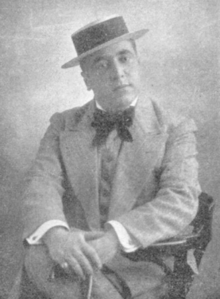Caton Theodorian | |
|---|---|
 Theodorian, photographed ca. 1911 | |
| Born | May 14, 1871 Craiova |
| Died | January 8, 1939 (aged 67) Bucharest |
| Pen name | Alexandru Răzvan, Olymp, Zaveră |
| Occupation | journalist, civil servant, stage actor |
| Nationality | Romanian |
| Period | 1890–1939 |
| Genre | tragedy, comedy, farce, sketch story, novella, memoir, psychological novel, lyric poetry |
| Literary movement | Naturalism Literatorul Sburătorul |
| Signature | |
Caton Theodorian, or Teodorian (May 14, 1871 – January 8, 1939), was a Romanian playwright, poet, short story writer and novelist. A maternal nephew of the politician Eugeniu Carada, he was, through his Oltenian father, a scion of the boyar nobility. His noble origins informed his chief works in both naturalistic fiction and drama, which mainly deal with social decline and boyar obsessions with heredity. Although showcased by the National Theater Bucharest, Theodorian's plays were dismissed by critics as vulgar or wordy, and were sometimes rejected by the public. His most treasured contribution was a 1915 comedy, Bujoreștii ("The Bujorescus"), which synthesizes his recurrent themes. A moderate in ideological terms, the writer never openly affiliated with either the Romanian Symbolists or their Sămănătorul rivals, but frequented and was published by both. During the final twenty years of his life, he was attached to the Sburătorul circle.
In addition to writing, of which he did relatively little, Theodorian worked as an actor and prompter, a newspaper editor, and finally as a clerk. He had jobs with various state regulatory bodies, and several times with the Romanian Police, briefly serving as commissioner in Vâlcea County. He then had a prominent position in the Romanian Writers' Society, but resigned due to political disagreements during the early stages of World War I. Like his brother Mariu Theodorian-Carada, Caton disliked the Entente Powers, and opposed Romania's entry into the war. He spent the war years fleeing occupation and bombardments, moving from Valea Mare to Iași, then to Paris, Lausanne, and Bern. He returned to a prominent job in the Romanian Arts Ministry, and, in his final year, took an executive position in the new General Directorate of the Press and Propaganda; he was also the founder, and for long president, of the Society of Romanian Dramatic Authors.